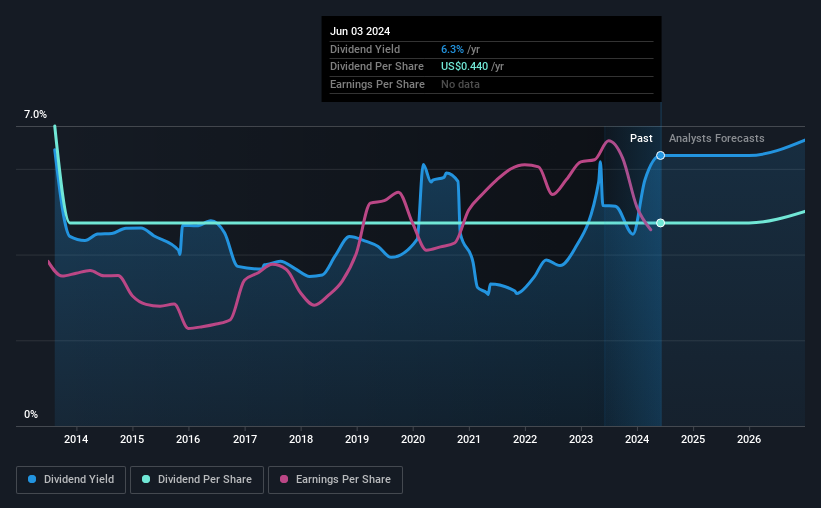- United States
- /
- Banks
- /
- NasdaqGS:VLY
Valley National Bancorp (NASDAQ:VLY) Is Paying Out A Dividend Of $0.11

Valley National Bancorp (NASDAQ:VLY) has announced that it will pay a dividend of $0.11 per share on the 2nd of July. This means the annual payment is 6.3% of the current stock price, which is above the average for the industry.
See our latest analysis for Valley National Bancorp
Valley National Bancorp's Dividend Forecasted To Be Well Covered By Earnings
Impressive dividend yields are good, but this doesn't matter much if the payments can't be sustained.
Having distributed dividends for at least 10 years, Valley National Bancorp has a long history of paying out a part of its earnings to shareholders. Based on Valley National Bancorp's last earnings report, the payout ratio is at a decent 52%, meaning that the company is able to pay out its dividend with a bit of room to spare.
Over the next 3 years, EPS is forecast to expand by 41.1%. Analysts forecast the future payout ratio could be 42% over the same time horizon, which is a number we think the company can maintain.

Dividend Volatility
The company has a long dividend track record, but it doesn't look great with cuts in the past. The dividend has gone from an annual total of $0.65 in 2014 to the most recent total annual payment of $0.44. Doing the maths, this is a decline of about 3.8% per year. A company that decreases its dividend over time generally isn't what we are looking for.
The Dividend's Growth Prospects Are Limited
With a relatively unstable dividend, it's even more important to evaluate if earnings per share is growing, which could point to a growing dividend in the future. It's not great to see that Valley National Bancorp's earnings per share has fallen at approximately 2.6% per year over the past five years. If the company is making less over time, it naturally follows that it will also have to pay out less in dividends. It's not all bad news though, as the earnings are predicted to rise over the next 12 months - we would just be a bit cautious until this can turn into a longer term trend.
In Summary
In summary, while it's good to see that the dividend hasn't been cut, we are a bit cautious about Valley National Bancorp's payments, as there could be some issues with sustaining them into the future. While Valley National Bancorp is earning enough to cover the dividend, we are generally unimpressed with its future prospects. We would be a touch cautious of relying on this stock primarily for the dividend income.
Investors generally tend to favour companies with a consistent, stable dividend policy as opposed to those operating an irregular one. Still, investors need to consider a host of other factors, apart from dividend payments, when analysing a company. Taking the debate a bit further, we've identified 2 warning signs for Valley National Bancorp that investors need to be conscious of moving forward. If you are a dividend investor, you might also want to look at our curated list of high yield dividend stocks.
If you're looking to trade Valley National Bancorp, open an account with the lowest-cost platform trusted by professionals, Interactive Brokers.
With clients in over 200 countries and territories, and access to 160 markets, IBKR lets you trade stocks, options, futures, forex, bonds and funds from a single integrated account.
Enjoy no hidden fees, no account minimums, and FX conversion rates as low as 0.03%, far better than what most brokers offer.
Sponsored ContentNew: Manage All Your Stock Portfolios in One Place
We've created the ultimate portfolio companion for stock investors, and it's free.
• Connect an unlimited number of Portfolios and see your total in one currency
• Be alerted to new Warning Signs or Risks via email or mobile
• Track the Fair Value of your stocks
Have feedback on this article? Concerned about the content? Get in touch with us directly. Alternatively, email editorial-team (at) simplywallst.com.
This article by Simply Wall St is general in nature. We provide commentary based on historical data and analyst forecasts only using an unbiased methodology and our articles are not intended to be financial advice. It does not constitute a recommendation to buy or sell any stock, and does not take account of your objectives, or your financial situation. We aim to bring you long-term focused analysis driven by fundamental data. Note that our analysis may not factor in the latest price-sensitive company announcements or qualitative material. Simply Wall St has no position in any stocks mentioned.
About NasdaqGS:VLY
Valley National Bancorp
Operates as the holding company for Valley National Bank that provides various commercial, private banking, retail, insurance, and wealth management financial services products.
Flawless balance sheet established dividend payer.


